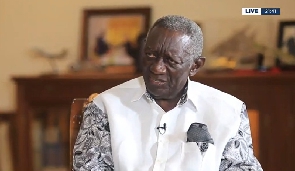Business News of Thursday, 7 June 2012
Source: GNA
Western Region debates petroleum management
The people of Western Region, on Thursday discussed the management of petroleum revenue received in 2011, at the first public forum held in Takoradi by the Public Interest and Accountability Committee (PIAC).
The PIAC was inaugurated by Government in September 2011 to monitor and evaluate revenue accrued from oil production off Cape Three Points in the Western Region in compliance with the Petroleum Management law, (Act 815).
Participants, including traditional rulers, non-governmental organizations, political party representatives, journalists, heads of departments and members of the public attended the event.
Some of the participants were of the view that the region where the oil is being explored should benefit most in terms of infrastructure and development of human resource.
They said the 18 per cent share contract with the oil companies was woefully inadequate, and called for upward adjustment to reflect current economic trends.
Chairman of the PIAC, Major Daniel Ablorh-Quarcoo, said total oil revenue stood at GH¢1,250.00 million in 2011, and this was channeled into the budget, road infrastructure and agriculture.
He said according to projections, Ghana was supposed to be producing approximately 120,000 barrels of oil per day by June 2011, but the target was not achieved by the end of 2011 due to technical production challenges.
Mr. Paul Evans Aidoo, Western Regional Minister, in a speech read on his behalf, said the release of the PIAC report was a mark of good governance.
“They are sending a strong signal to the industry players that indeed, they will be accountable for all their actions and inactions according to the law.”
Mr. Aidoo said lack of transparency in the oil sector would encourage corruption and breed unnecessary mistrust that could generate confusion and destabilize the economy.
He therefore advocated the tenets of transparency as entrenched in Act 815 to avoid the resource curse.
Mr. Aidoo said, “By promulgating Act 815, we have shown a strong commitment to managing our newly found resource in a prudent manner.”
He reiterated the President’s pledge that, as Ghana joined other oil nations, the country would ensure that the resources were utilized judiciously to benefit the people.**











